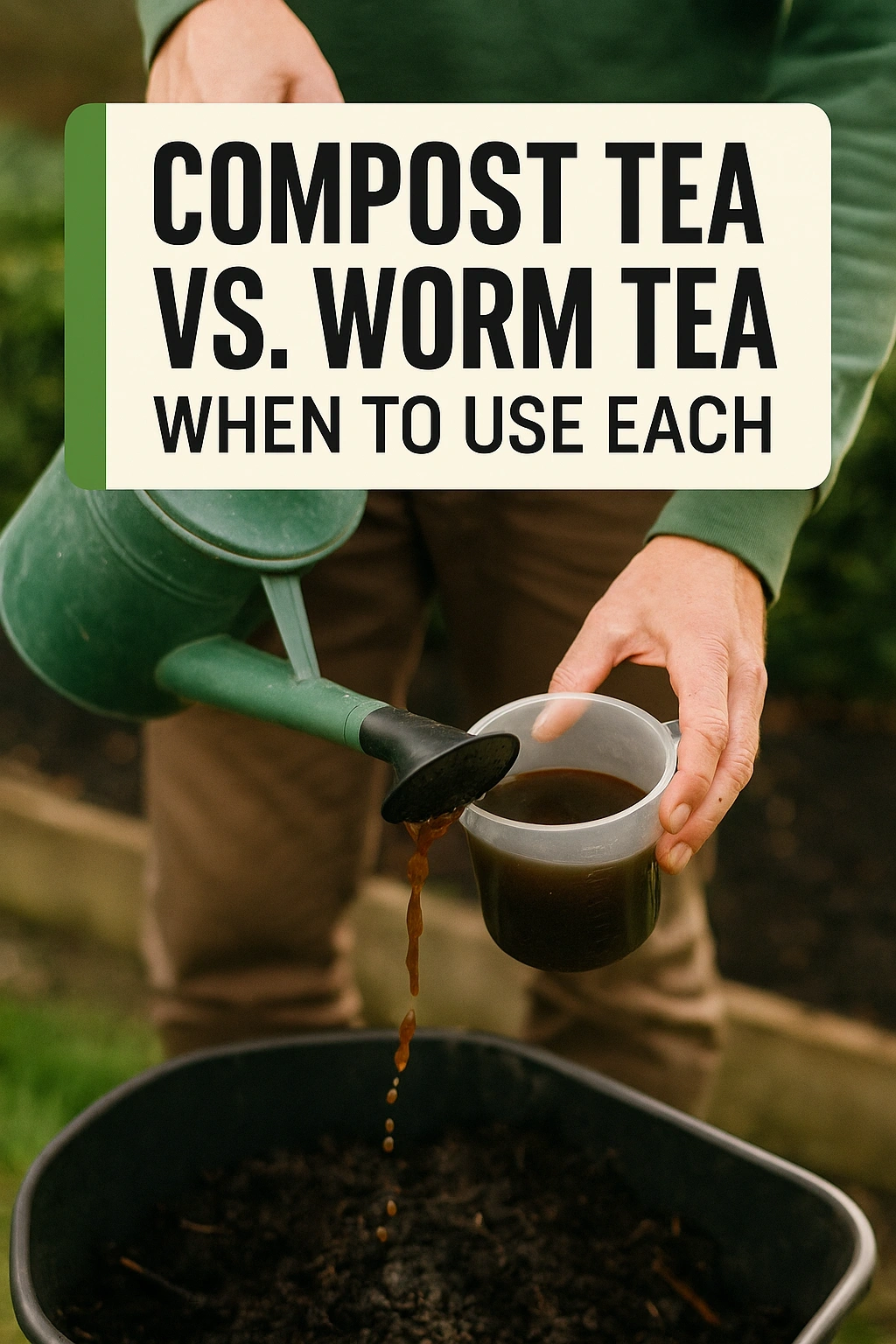
Compost tea and worm tea are two popular organic fertilizers that gardeners use to enhance soil quality and plant health. Each offers unique benefits and uses, but many may wonder when to use one over the other. This article explores the key differences between these two liquid fertilizers, their preparation methods, and their optimal applications in gardening.
What is Compost Tea?
Compost tea is a nutrient-rich liquid produced by steeping compost in water. The process allows beneficial microorganisms, nutrients, and organic matter from the compost to leach into the water, creating a powerful fertilizer. It is typically used to improve soil health, boost plant growth, and combat diseases.
Benefits of Compost Tea
- Enhances Soil Microbiology: Compost tea is teeming with beneficial bacteria and fungi that promote healthy soil ecosystems.
- Improves Nutrient Availability: The nutrients in compost tea are readily available to plants, enhancing their growth and resilience.
- Reduces Plant Diseases: Applying compost tea can suppress certain soil-borne diseases due to its microbial content.
What is Worm Tea?
Worm tea, often referred to as vermicompost tea, is a liquid fertilizer created from the leachate of worm castings. This process involves soaking worm castings in water, allowing nutrients and beneficial microorganisms to dissolve into the liquid. Worm tea is prized for its high nutrient content and is used similarly to compost tea.
Benefits of Worm Tea
- Rich in Nutrients: Worm tea contains a balanced supply of nutrients, including nitrogen, phosphorus, and potassium, essential for plant growth.
- High Microbial Content: It is rich in beneficial microorganisms that contribute to soil health and plant vitality.
- Improves Soil Structure: The application of worm tea can enhance soil aeration and water retention, promoting healthier root systems.
Key Differences Between Compost Tea and Worm Tea
While compost tea and worm tea share similar goals in improving plant health and soil quality, they differ significantly in their origins, nutrient profiles, and microbial contents.
Source and Preparation
Compost tea is derived from compost, which is a mixture of decomposed organic matter, while worm tea comes specifically from worm castings. The preparation method also varies; compost tea typically involves steeping compost in water for 24 to 48 hours, whereas worm tea is made by soaking worm castings in water for a shorter period, usually around 24 hours.
Nutrient Composition
Compost tea generally has a broader range of nutrients due to the diversity of materials in compost. In contrast, worm tea tends to have higher concentrations of specific nutrients, particularly nitrogen, making it particularly beneficial for leafy greens and fast-growing plants.
When to Use Compost Tea
Compost tea is best used in various gardening situations, particularly when aiming to improve overall soil health and plant resilience.
Optimal Applications of Compost Tea
- Soil Amendment: Use compost tea to enrich the soil before planting or during the growing season to enhance microbial activity.
- Foliar Spray: Applying compost tea directly to leaves can help combat diseases and promote nutrient absorption.
- Transplanting: Soaking new plants in compost tea before transplanting can reduce transplant shock and encourage quicker establishment.
When to Use Worm Tea
Worm tea shines in specific scenarios due to its nutrient-dense profile and microbial benefits, making it ideal for particular crops and conditions.
Optimal Applications of Worm Tea
- Leafy Vegetables: The high nitrogen content in worm tea makes it excellent for supporting leafy vegetable growth.
- Container Plants: Worm tea can provide concentrated nutrients for potted plants, ensuring they receive adequate nourishment.
- Hydroponics: Worm tea is a great addition to hydroponic systems, providing nutrients in a soluble form for water-based growing systems.
How to Make Compost Tea and Worm Tea
Making your own compost tea or worm tea is a straightforward process that can be done at home, allowing you to utilize your organic waste effectively.
Steps to Make Compost Tea
- Gather Materials: Use well-aged compost, a bucket, and non-chlorinated water.
- Steep the Compost: Mix one part compost with five parts water in the bucket and let it steep for 24 to 48 hours.
- Strain and Use: After steeping, strain the liquid and use it immediately for best results.
Steps to Make Worm Tea
- Gather Materials: Use fresh worm castings, a bucket, and non-chlorinated water.
- Soak the Castings: Mix one part worm castings with five parts water and let it steep for 24 hours.
- Strain and Use: Strain the mixture and apply it directly to your plants.
FAQs
Can I use compost tea and worm tea together?
Yes, combining compost tea and worm tea can provide a rich array of nutrients and beneficial microorganisms, enhancing the overall health of your plants.
How often should I apply compost tea or worm tea?
Both compost tea and worm tea can be applied every two to four weeks, depending on the needs of your plants and soil condition.
Is there a risk of over-fertilizing with compost tea or worm tea?
While both are organic fertilizers, it is possible to over-apply them. Always monitor plant responses and adjust frequency and concentration as needed.
Can I use compost tea or worm tea on seedlings?
Yes, both compost tea and worm tea can benefit seedlings when diluted appropriately. Start with a more diluted solution to avoid overwhelming young plants.
What is the shelf life of compost tea and worm tea?
Compost tea and worm tea are best used fresh. If stored, use within a week to prevent the growth of harmful bacteria and maintain efficacy.
